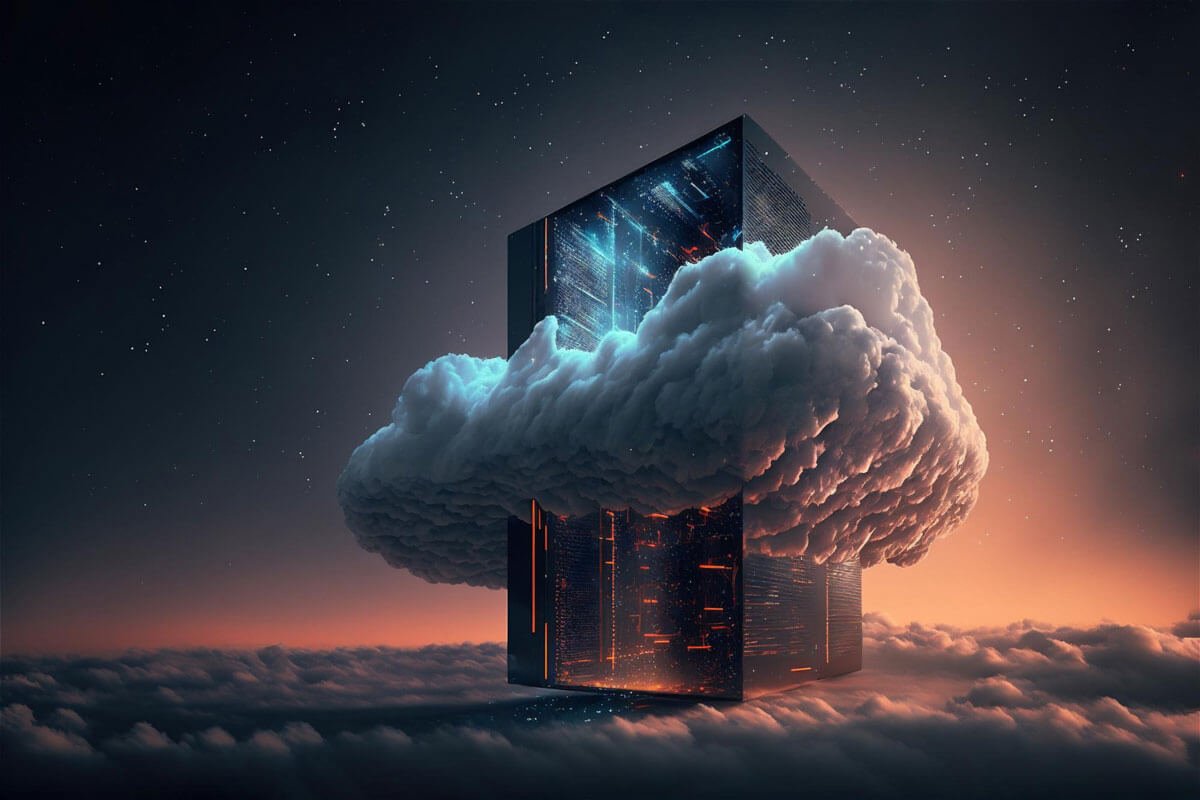
Introduction to Cloud Computing
In today’s rapidly evolving digital landscape, cloud computing has become a cornerstone for businesses of all sizes. Whether you’re a startup or an established enterprise, understanding cloud computing is crucial for staying competitive and agile in the market.
What is Cloud Computing?
At its core, cloud computing refers to the delivery of computing services—including servers, storage, databases, networking, software, analytics, and intelligence—over the internet or “the cloud.” Instead of owning their own computing infrastructure or data centers, companies can rent access to anything from applications to storage from a cloud service provider.
The Evolution of Cloud Computing
Cloud computing has evolved from being a niche technology to a mainstream necessity. In the past, businesses relied on physical servers and hardware to manage their data and applications. However, with the advent of cloud computing, companies can now access vast computing resources on-demand, without the need for significant upfront investments.
Why Cloud Computing Matters
Cloud computing offers unparalleled benefits that are driving its adoption across industries. It enables businesses to scale their operations, reduce costs, and innovate faster. Moreover, it provides the flexibility to access resources from anywhere, making it an essential tool for modern businesses.
Types of Cloud Computing Services
Infrastructure as a Service (IaaS)
IaaS is the most basic category of cloud computing services. With IaaS, businesses can rent IT infrastructure—servers, virtual machines, storage, networks, and operating systems—from a cloud provider on a pay-as-you-go basis. This model is ideal for companies that want to avoid the cost and complexity of buying and managing their own physical servers.
Platform as a Service (PaaS)
PaaS goes a step further by providing a platform that allows developers to build, test, and deploy applications quickly and efficiently. PaaS eliminates the need to manage the underlying infrastructure, enabling developers to focus on writing code and creating applications.
Software as a Service (SaaS)
SaaS is a cloud-based software distribution model in which applications are hosted by a cloud service provider and made available to customers over the Internet. Common examples include email services, customer relationship management (CRM) systems, and office productivity tools. SaaS applications are typically accessed via web browsers, making them easy to use and accessible from any device.
Types of Cloud Deployment Models
Public Cloud
In a public cloud model, the cloud infrastructure is owned and operated by a third-party cloud service provider and is made available to the general public. Public clouds are ideal for businesses that need to scale their resources quickly and affordably, without the need for significant upfront investments.
Private Cloud
A private cloud is a cloud computing environment dedicated to a single organization. Unlike public clouds, private clouds offer greater control over data and infrastructure, making them a popular choice for businesses with strict security and compliance requirements.
Hybrid Cloud
Hybrid cloud environments combine elements of both public and private clouds, allowing businesses to leverage the benefits of both. For example, a company might use a private cloud for sensitive data and a public cloud for less critical applications. Hybrid clouds offer flexibility and scalability, making them a versatile option for many businesses.
Community Cloud
Community clouds are shared by several organizations with similar needs and concerns, such as regulatory compliance or industry standards. These clouds are managed and operated for a specific community, providing a collaborative environment that addresses shared concerns.
Benefits of Cloud Computing
Cost Efficiency
One of the most significant advantages of cloud computing is cost efficiency. By using cloud services, businesses can reduce the need for expensive hardware and infrastructure, lowering their capital expenditures. Additionally, the pay-as-you-go pricing model allows companies to pay only for the resources they use, further optimizing costs.
Scalability
Cloud computing offers unmatched scalability. Whether you’re experiencing rapid growth or seasonal fluctuations in demand, cloud services can easily scale up or down to meet your needs. This flexibility ensures that businesses can respond quickly to changing market conditions.
Flexibility and Mobility
With cloud computing, employees can access company resources from anywhere with an internet connection. This flexibility supports remote work, collaboration, and business continuity, enabling teams to work together seamlessly, regardless of location.
Improved Collaboration
Cloud computing enhances collaboration by providing shared access to documents, applications, and data. Teams can work on projects simultaneously, share updates in real time, and ensure that everyone is on the same page, leading to increased productivity and efficiency.
Disaster Recovery and Business Continuity
Cloud computing provides robust disaster recovery and business continuity solutions. By storing data and applications in the cloud, businesses can protect themselves against data loss and quickly recover from unexpected events, such as natural disasters or cyberattacks.
Challenges and Risks of Cloud Computing
Security Concerns
While cloud computing offers numerous benefits, it also comes with security risks. Data breaches, cyberattacks, and unauthorized access are potential threats that businesses must address. It’s essential to implement strong security measures, such as encryption, multi-factor authentication, and regular security audits.
Compliance and Regulatory Issues
Different industries have specific regulatory requirements that must be met when using cloud services. Businesses must ensure that their cloud provider complies with relevant regulations, such as GDPR, HIPAA, or SOC 2, to avoid legal issues and protect sensitive data.
Downtime and Reliability
Cloud services are not immune to downtime. While cloud providers typically offer high availability and uptime guarantees, businesses must have contingency plans in place to mitigate the impact of potential outages on their operations.
Data Transfer and Bandwidth Limitations
Transferring large volumes of data to and from the cloud can be time-consuming and expensive, especially if bandwidth is limited. Businesses need to consider these factors when planning their cloud migration and ongoing data management.
How to Get Started with Cloud Computing
Assessing Your Business Needs
Before adopting cloud computing, it’s crucial to assess your business needs and objectives. Identify which applications and processes would benefit most from the cloud and determine the level of security, compliance, and performance required.
Choosing the Right Cloud Service Provider
Selecting the right cloud service provider is a critical decision. Consider factors such as the provider’s reputation, security measures, pricing, support, and service level agreements (SLAs). Conduct thorough research and seek recommendations to ensure you’re making an informed choice.
Planning Your Cloud Migration
Migrating to the cloud requires careful planning and execution. Develop a detailed migration strategy that includes timelines, resource allocation, data transfer methods, and potential risks. It’s also essential to communicate the plan to all stakeholders and provide training to ensure a smooth transition.
Cloud Computing Best Practices
Data Security and Encryption
Protecting your data in the cloud is paramount. Implement robust encryption protocols for data at rest and in transit, and ensure that your cloud provider offers comprehensive security measures to safeguard your information.
Regular Backups
Regularly backing up your data is essential for ensuring business continuity. Establish a backup schedule that aligns with your business needs and store backups in multiple locations
to prevent data loss.
Monitoring and Management
Effective monitoring and management are critical for maintaining the performance and security of your cloud environment. Use monitoring tools to track resource usage, detect anomalies, and respond to potential issues in real time.
Understanding and Managing Costs
Cloud costs can quickly spiral out of control if not managed properly. Monitor your usage, optimize resource allocation, and take advantage of cost-saving features, such as auto-scaling and reserved instances, to keep your expenses in check.
How BahariWeb Technologies Can Assist
Cloud Computing Consulting
BahariWeb Technologies offers expert cloud computing consulting services to help businesses navigate the complexities of the cloud. Whether you’re just starting or looking to optimize your existing cloud infrastructure, our team can provide tailored guidance and support.
Cloud Migration Services
Our cloud migration services ensure a seamless transition to the cloud. We’ll work closely with your team to develop a migration strategy that minimizes disruption and maximizes the benefits of cloud computing.
Cloud Hosting Solutions
BahariWeb provides reliable and scalable cloud hosting solutions that cater to the unique needs of businesses in East Africa. With our hosting services, you can enjoy high availability, robust security, and exceptional performance.
Ongoing Support and Maintenance
We understand that cloud computing is an ongoing journey. That’s why we offer continuous support and maintenance to ensure your cloud environment remains secure, efficient, and up-to-date with the latest advancements.
The Future of Cloud Computing
Trends to Watch
The cloud computing landscape is constantly evolving, with new trends and technologies emerging regularly. Key trends to watch include the rise of edge computing, the increasing adoption of multi-cloud strategies, and the growing importance of cloud-native applications.
The Role of AI and Machine Learning in Cloud Computing
Artificial intelligence (AI) and machine learning (ML) are playing an increasingly significant role in cloud computing. These technologies are being integrated into cloud platforms to enhance automation, improve decision-making, and unlock new possibilities for businesses.
How Businesses Can Prepare for the Future
To stay ahead in the ever-changing cloud computing landscape, businesses must remain agile and adaptable. Investing in continuous learning, staying informed about industry trends, and embracing new technologies will be crucial for future success.
Conclusion
Recap of Key Points
Cloud computing offers a wealth of opportunities for businesses, from cost savings and scalability to improved collaboration and disaster recovery. However, it’s essential to approach cloud adoption with a clear strategy and an understanding of the potential challenges.
Final Thoughts on Cloud Computing
As the digital world continues to evolve, cloud computing will remain a vital tool for businesses seeking to innovate and stay competitive. By leveraging the power of the cloud, companies can unlock new opportunities and drive growth in an increasingly connected world.
FAQs
What is the difference between IaaS, PaaS, and SaaS? IaaS provides basic infrastructure services, PaaS offers a platform for application development, and SaaS delivers software applications over the Internet.
Is cloud computing secure? Yes, cloud computing can be secure if proper security measures, such as encryption, authentication, and regular monitoring, are in place.
How do I choose the right cloud service provider? Consider factors such as reputation, security, pricing, support, and service level agreements (SLAs) when selecting a cloud service provider.
What are the costs associated with cloud computing? Costs can vary based on usage, services, and provider. It’s essential to monitor usage and optimize resource allocation to manage expenses effectively.
How can BahariWeb Technologies help with cloud computing? BahariWeb Technologies offers consulting, migration, hosting, and ongoing support services to help businesses navigate and optimize their cloud computing journey.



